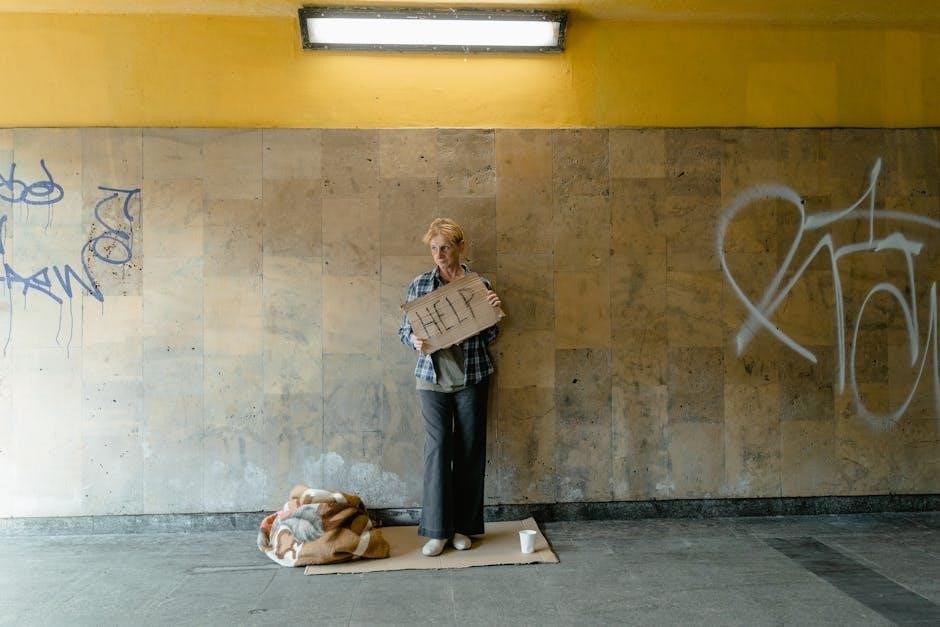Poor Economics by Abhijit Banerjee and Esther Duflo explores the lives of the global poor, offering insights into poverty through empirical evidence and innovative solutions;
1․1 Overview of the Book
Poor Economics by Abhijit Banerjee and Esther Duflo is a groundbreaking analysis of global poverty, offering insights into the lives of the poor through empirical research․ The book challenges broad generalizations about poverty, emphasizing the importance of understanding the economic decisions of the poor․ It advocates for small, evidence-based interventions rather than grand theories, providing a fresh perspective on how to address poverty effectively․ The authors use data from 13 countries to illustrate their arguments, making it a essential read for policymakers and researchers․
1․2 Authors: Abhijit Banerjee and Esther Duflo
Abhijit Banerjee and Esther Duflo, renowned MIT economists, co-authored Poor Economics․ Their work emphasizes evidence-based approaches to poverty, utilizing randomized control trials․ Banerjee and Duflo’s research spans 15 years, covering 13 countries, and challenges traditional poverty alleviation methods․ Their innovative perspective earned them the 2019 Nobel Prize in Economics, solidifying their influence in development economics․ Their collaborative efforts have reshaped global poverty policies, offering practical solutions grounded in empirical data․

Key Concepts in “Poor Economics”
Key concepts include understanding poverty through data, the economic lives of the poor, and the role of randomized trials in testing small, evidence-based interventions to address global poverty effectively․
2․1 Understanding Poverty Through Data
Understanding poverty through data involves analyzing the economic lives of the poor, using surveys and empirical evidence to uncover patterns and challenges․ Banerjee and Duflo’s research compiles data from 13 countries, focusing on those living on less than $2 per day․ This approach rejects broad generalizations, instead emphasizing the complexity of poverty and the need for nuanced solutions․ By listening to the poor and studying their financial decisions, the authors reveal insights into how poverty persists and how it can be effectively addressed․
2․2 The Economic Lives of the Poor
Banerjee and Duflo provide a detailed portrayal of the economic lives of the poor, revealing their daily struggles and financial strategies․ They document how individuals living on less than $2 per day manage scarce resources, often engaging in complex financial decisions․ The book highlights how the poor borrow, save, and invest, challenging stereotypes about their economic behavior․ These insights, drawn from extensive field research, offer a nuanced understanding of poverty and its complexities․
2․3 The Role of Randomized Control Trials
Randomized control trials (RCTs) are central to Banerjee and Duflo’s approach, providing rigorous evidence to test poverty interventions․ By randomly assigning treatments, RCTs identify what works and why, ensuring policies are based on empirical results․ This methodological innovation allows for precise insights into the effectiveness of programs, helping to design better solutions for the poor without relying on assumptions or broad generalizations․
The Authors’ Approach to Poverty
Banerjee and Duflo reject broad theories, emphasizing data-driven insights and small, tested interventions to address poverty, focusing on the poor’s economic lives and evidence-based solutions․
3․1 Rejecting Broad Generalizations
Banerjee and Duflo argue against broad theories, instead emphasizing the complexity of poverty․ They advocate for nuanced, context-specific solutions based on empirical evidence rather than one-size-fits-all approaches․
3․2 Listening to the Poor
Banerjee and Duflo stress the importance of understanding the daily choices and challenges of the poor․ By listening to their experiences, policymakers can design interventions that address real needs, fostering effective and sustainable solutions․ This approach ensures that aid is both relevant and impactful, rather than imposing top-down solutions that often fail to deliver lasting change․
3․4 Small, Tested Interventions
Banerjee and Duflo advocate for small-scale, evidence-based interventions to combat poverty․ These targeted approaches, often tested through randomized control trials, allow for precise understanding of what works․ By focusing on incremental changes, such as microfinance or improved healthcare access, these interventions can effectively improve the lives of the poor without overhauling entire systems․ This method ensures resources are used efficiently, leading to meaningful and sustainable progress in poverty reduction efforts․

Major Findings and Insights
Poor Economics reveals the paradox of poverty, where simple solutions often fail․ It emphasizes the importance of empirical evidence to understand and address poverty effectively․
4․1 The Paradox of Poverty
The paradox of poverty lies in the persistence of destitution despite seemingly simple solutions․ Banerjee and Duflo reveal that the poor often make rational decisions based on their constrained circumstances, which can trap them in cycles of poverty․ For instance, investments in health or education may be sacrificed for immediate survival needs, highlighting how well-intentioned interventions can fail without addressing these complexities․
4․2 Why Simple Solutions Fail
Simple solutions often fail due to misunderstandings of the poor’s complex realities․ Programs like microloans or food subsidies may not address root causes, such as limited access to education or healthcare․ Banerjee and Duflo emphasize that one-size-fits-all approaches neglect local contexts, leading to unintended consequences․ Effective interventions require nuanced, evidence-based strategies tailored to specific needs, rather than blanket solutions that overlook the diversity of poverty experiences;
4․3 The Importance of Empirical Evidence
Banerjee and Duflo stress the critical role of empirical evidence in addressing poverty․ By conducting randomized control trials, they demonstrate how data-driven approaches can reveal what truly works․ This method ensures policies are grounded in reality, avoiding ineffective solutions based on assumptions․ Their work highlights the necessity of rigorous testing to design interventions that meaningfully improve the lives of the poor, making empirical evidence a cornerstone of effective poverty reduction strategies․

Policy Implications and Recommendations
Poor Economics advocates for evidence-based policies, emphasizing small-scale, targeted interventions rooted in understanding the poor’s needs, leading to more effective and sustainable poverty reduction strategies globally․
5․1 Rethinking Global Poverty Alleviation
Poor Economics challenges traditional approaches to poverty reduction, advocating for a shift from broad, generalized solutions to targeted, evidence-based interventions․ Banerjee and Duflo emphasize the importance of understanding the specific contexts and behaviors of the poor, rather than relying on assumptions․ By focusing on small, actionable changes and leveraging randomized control trials, their approach aims to create more effective and sustainable pathways out of poverty, reshaping global development strategies․
5․2 The Role of Development Economics
Poor Economics highlights the critical role of development economics in addressing global poverty․ By employing rigorous empirical methods, including randomized control trials, economists can design policies that effectively target the needs of the poor․ Banerjee and Duflo demonstrate how this field bridges theory with real-world application, offering actionable insights that policymakers can use to create meaningful change and improve the lives of millions living in poverty worldwide through evidence-based solutions․
5․3 Innovations in Poverty Reduction
Poor Economics emphasizes the importance of innovative, evidence-based solutions to reduce poverty․ Banerjee and Duflo advocate for small-scale, tested interventions, such as microfinance programs, healthcare initiatives, and financial tools tailored to the poor․ These approaches, grounded in rigorous research, aim to address specific challenges faced by the poor, ensuring sustainable improvements in their lives and livelihoods through targeted and effective strategies that prioritize their needs and contexts․

The Impact of “Poor Economics”
Poor Economics has significantly influenced development economics, inspiring evidence-based policies and earning the authors the 2019 Nobel Prize in Economics for their groundbreaking work․
6․1 Influence on Development Economics
Poor Economics revolutionized development economics by emphasizing empirical evidence over theoretical models, shifting focus to understanding the daily lives of the poor․ Banerjee and Duflo’s use of randomized control trials set a new standard for evaluating poverty interventions․ Their approach, detailed in the book, has reshaped policy-making, encouraging governments and NGOs to adopt more targeted and effective strategies․ This shift has led to more sustainable and impactful solutions globally․
6․2 The 2019 Nobel Prize in Economics
Abhijit Banerjee and Esther Duflo, along with Michael Kremer, were awarded the 2019 Nobel Prize in Economics for their groundbreaking work on global poverty․ Their experimental approach, detailed in Poor Economics, was recognized for transforming development economics․ The Nobel Committee highlighted their use of randomized control trials to design and evaluate anti-poverty programs, demonstrating how evidence-based policies can effectively reduce poverty worldwide․ This accolade underscored the book’s profound impact on both academia and policy-making․
6․3 Reviews and Reception
Poor Economics received widespread acclaim for its innovative approach to understanding poverty․ Reviewers praised the book’s empirical rigor and accessible storytelling․ It was described as a “radical rethink” of poverty solutions, offering actionable insights through real-world examples․ The book’s focus on evidence-based policies resonated with scholars and policymakers alike․ Its impact extended beyond academia, influencing public discourse on global development and earning recognition as a landmark work in its field․
Availability and Access to the Book
Poor Economics is widely available in PDF format on platforms like publicaffairsbooks․com, Amazon, and Google Books, ensuring easy access for readers worldwide to this influential work․
7․1 “Poor Economics” in PDF Format
The book Poor Economics by Abhijit Banerjee and Esther Duflo is widely available in PDF format․ Readers can access it through platforms like publicaffairsbooks․com, Amazon, and Google Books․ The PDF version ensures easy readability on multiple devices, making it convenient for global access․ With its ISBN 978-1-58648-798-0, the PDF is a popular choice for students and researchers seeking a digital copy of this influential work on global poverty․
7․2 Digital Platforms and Availability
Poor Economics is accessible on major digital platforms like Amazon Kindle, Google Books, and Apple Books․ The PDF version is available for download on the publisher’s website and other e-book retailers․ Additionally, platforms like Scribd and Kobo offer the book in various digital formats․ Its widespread availability ensures global readers can access this groundbreaking work on poverty alleviation, making it a valuable resource for students, researchers, and policymakers worldwide․
7․4 Educating the Next Generation
Poor Economics serves as a vital educational resource, inspiring future economists and policymakers․ Its clear, evidence-based approach makes it a popular textbook in universities worldwide․ The book’s insights into poverty alleviation encourage students to think critically about development economics․ Additionally, its accessibility in PDF and digital formats ensures that young researchers and learners can easily engage with its groundbreaking ideas, fostering a new generation of leaders equipped to tackle global poverty effectively․
Poor Economics reshapes our understanding of global poverty, offering actionable insights and inspiring transformative solutions․ Its legacy continues to influence development economics and poverty reduction efforts worldwide․
8․1 The Legacy of “Poor Economics”
Poor Economics has left a lasting impact on development economics, reshaping how policymakers and researchers approach poverty․ By emphasizing evidence-based solutions and rejecting broad generalizations, the book inspired a new generation of economists․ Its innovative use of randomized control trials and focus on understanding the poor’s lives has influenced global poverty alleviation strategies․ The authors’ Nobel Prize in 2019 further cemented the book’s legacy, making it a cornerstone of modern development economics and a vital resource for combating poverty worldwide․
8․2 Continuing the Fight Against Poverty
Poor Economics has ignited a movement to rethink poverty alleviation, inspiring researchers and policymakers to adopt evidence-based approaches․ By emphasizing small, tested interventions and listening to the poor, the book has fostered innovation in development economics․ Its legacy continues to drive progress, offering hope for meaningful change and sustainable solutions to global poverty, ensuring the fight against poverty remains informed, compassionate, and effective for future generations․